
Guide
Thank you, Community! How you helped me tidy my desk
by Lorenz Keller

The Ugreen Nexode is a powerful desktop charger with two special features. But is it worth the hefty price tag?
Constantly having to recharge my gadgets is a pain in the butt. There’s my phone, camera, headphones and MacBook – all clamouring for a power boost. And don’t even get me started on my plethora of test devices. I’ve got an entire rope of charging cables stretching across my desk. Although things have become slightly more orderly since I banished the chargers to a box, the flip side is that my charging sockets have disappeared along with them. Cue charger specialist Ugreen, which has a solution for me in the form of the Nexode.
With the Ugreen charging station, you can charge all your devices at once. It’s stylish enough to get a visible spot on my office desk, and doesn’t need to be hidden away anywhere. When setting up the almost nine-centimetre-high, six-centimetre-wide gismo, it strikes me that it’s fairly heavy for its size.
It comes in at almost 600 grammes when I weigh it on a set of scales. One thing’s for certain: I won’t be taking the charging dock out and about with me. Instead, I’ll keep it in my home office. Why is it so heavy? Partly because it contains a lot of technology, including protection against short circuits, overvoltage and overheating, and a control unit that monitors power distribution. However, it may well be heavy in order to keep the Nexode stable, enabling it to securely hold a smartphone.
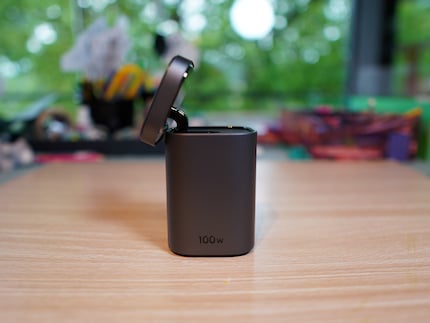
Ugreen uses gallium nitride, an expensive semiconductor material, in the Nexode. That’s why it’s described as a GaN charger, a designation you’ll find on many high-quality chargers. The crystalline material is used as an alternative to silicon because it’s both an excellent conductor and very resistant. As a result, it allows manufacturers to make smaller chargers that get less hot, even at high power.
Lo and behold, the Nexode on my desk barely heats up – even if I’m charging, say, my MacBook and two smartphones.
You can connect a maximum of four gadgets to the Nexode at once. Once you’ve hooked up your devices, you have three different charging options. What makes the Nexode stand out is the wireless charging pad on the top – a feature you’ll find on almost no other device.
This opens like the lid of a tin, and you can attach your phone to it magnetically. Held in mid-air at an angle, the phone then charges. The technology underpinning it is Magsafe, a feature so far only seen in Apple devices from the iPhone 12 onwards.
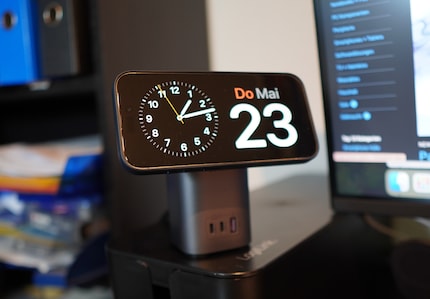
This is handy, because instead of just lying around while it’s charging, my iPhone shows me the time, date, calendar, weather and other information. It’s all clearly displayed in landscape format thanks to iOS 17’s standby mode. I often look at it, especially when I’m working from home, thinking: what time is it? What’s today’s date?
However, the Magsafe charging pad can only be positioned at a 65-degree angle. If you want to use your iPhone as a webcam (which is easy to do with the MacBook), you won’t be able to do so with your main camera. All that’s able to film is the tabletop. I also would’ve liked a more flexible hinge so that I could correct any reflections appearing on the screen.
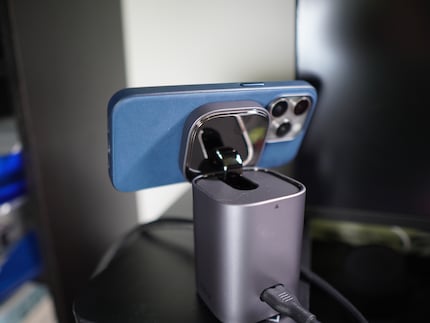
Android devices can be retrofitted with magnetic covers so that they can stick to the charger in the same position. However, as the manufacturer doesn’t use Qi2, it charges Android devices at half the speed at best. Still, at least the lid and charging pad can be folded down. This means I can place any smartphone with a wireless charging function on it, even if it doesn’t have magnets.
You can read more about Qi2 in the following article:
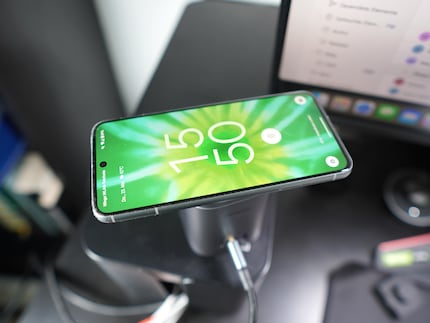
In addition to the wireless charging pad, there are also three ports – two USB-C and one USB-A. The USB-C ports deliver a maximum of 100 watts, while the USB-A port goes up to 22.5 watts. If several gadgets are connected, these potential 100 watts are divided between devices. This, of course, extends the charging time. These days, 100 watts is middling – there are chargers out there packing twice the power.
Naturally, I tried the feature out. My Samsung Galaxy Fold charges at 15-20 watts, though a maximum of 25 watts would be possible. It’s worth mentioning, however, that smartphones regulate the optimum current themselves. My MacBook drew 50 to 60 watts of power – pretty much the maximum when charging via the USB-C port.
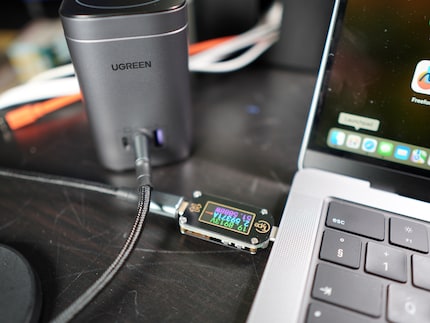
When using the charging station, it’s important you use high-quality cables capable of supporting an output of 100 watts. I personally went for this model, which is also suitable for data transfer. This means I now have a decent cable I can use in any situation.
Though the Ugreen Nexode may not be suitable for every situation, it’s certainly good for many of them. I personally would’ve liked it to have one or two extra charging slots. Then again, I’m also someone with an above-average number of gadgets in need of charging.
This power bank is ideal for anyone who needs charging slots on their office desk and a charging dock for their iPhone at the same time. It’s a combination you don’t find on the market all that often. Ugreen has brought it to fruition in a product that boasts clever design and a decent amount of power.
Given the Ugreen Nexode isn’t exactly a bargain, the charging station needs to be almost totally in line with your needs in order for the investment to be worthwhile.
Pro
Contra
Gadgets are my passion - whether you need them for the home office, for the household, for sport and pleasure or for the smart home. Or, of course, for the big hobby next to the family, namely fishing.
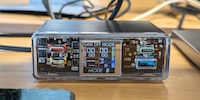
Product test
by Lorenz Keller
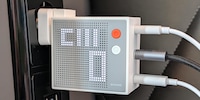
Product test
by Lorenz Keller
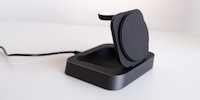
Product test
by Martin Jungfer